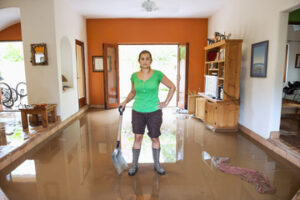Basement Remodeling Contractor can transform a dark, underused space into a comfortable, stylish room. When choosing a contractor, consider their experience and expertise, as well as their portfolio of past work.

Effective communication between the contractor and homeowner is essential for a successful remodel. This includes establishing an agreed-upon schedule and communicating regularly with progress updates.
When you’re planning a basement remodeling project, it’s important to hire the right contractor for the job. A qualified and experienced professional can save you time, money, and headaches. This type of contractor will also have a strong understanding of the challenges that may arise during the process, and they will be able to handle these problems efficiently.
One of the most significant challenges in basement remodeling is dealing with building codes and permits. A qualified contractor will know how to obtain these documents and ensure that your basement remodel complies with local regulations. In addition, they will be able to navigate the complex process of working with plumbing and electrical contractors. This will ensure that your basement remodel is completed on time and without any delays.
Another challenge is finding the right materials for your basement remodel. A qualified contractor will be able to recommend the best material for your budget and style. They will also be able to help you select the right flooring, paint colors, and other fixtures. They will also be able to advise you on the best layout for your basement. This will allow you to maximize your space and create a functional and stylish space that fits your needs.
A qualified contractor will also be able to provide expert advice on lighting, ventilation, and storage options. This will help you save money and ensure that your finished basement is safe and healthy for your family.
Finally, a qualified basement remodeling contractor will have a wide range of connections with suppliers and subcontractors. This will allow them to get discounted prices on the highest quality products, which they can pass on to their clients. This will help you save money and ensure the best return on your investment.
When choosing a Basement Remodeling Contractor, make sure they have experience and a proven track record. Check their portfolio and reviews, and make sure they are licensed and insured. This will protect you from liability and ensure that the work is done to the highest standards. The right contractor will be able to turn your dreary basement into a beautiful living space that adds value to your home.
Design-Build
Basement remodeling can be a challenging process. It requires careful planning, and it’s important to work with a qualified contractor that has experience in the field. A good contractor will take into account your design and budgetary goals, and they’ll help you choose materials that are durable and stylish. They’ll also make sure that your finished basement complies with local building codes and safety regulations.
The basement environment is unique, requiring different building materials than those used in the rest of the house. Unfortunately, many general contractors don’t understand this difference and use the same materials throughout the basement. This can lead to moldy drywall, sagging ceilings, and musty smells.
Choosing a qualified contractor will ensure that your finished basement meets your lifestyle and aesthetic preferences, and will add value to your home. A reputable company will offer a detailed contract that outlines the project’s scope of work and timeline. They will also provide a breakdown of costs and options, and they’ll keep open lines of communication to ensure that your project is completed on time and within budget.
A reputable contractor will also address any moisture issues in the basement, ensuring that it’s a safe and healthy space for your family. They’ll ensure that the walls and ceilings are watertight, and they’ll install a system to manage moisture and humidity. They’ll also make sure that the plumbing and electrical systems are up to code and can handle the demands of your new space.
A reputable contractor will create a realistic budget for your project, taking into account material and labor costs. They’ll also address any potential unforeseen costs by allocating a contingency fund. This will protect you from over-budgeting and minimize project delays. A skilled contractor will also pay close attention to detail and have a problem-solving mindset. This will help them avoid costly mistakes and keep your remodel on schedule.
Reputation
A basement remodel is one of the most significant home improvement projects that you can undertake, and it’s essential to partner with a contractor with an excellent reputation. A reputable contractor will stay up-to-date on the latest techniques and advancements in the industry, and they’ll offer innovative solutions to transform your basement into an attractive living space. They will also ensure that the work complies with building codes and safety regulations, including proper egress and ventilation.
Basement finishing or remodeling projects can be complex and require extensive planning and skillful execution. A reputable contractor will have an in-depth understanding of the construction industry, which allows them to assess your basement’s requirements accurately and recommend the most suitable materials and fixtures for your renovation. This will help reduce project costs and deliver superior quality results.
Adding a new room to your home, such as a basement entertainment area or a new bathroom, can significantly increase its value and enhance your family’s comfort. New rooms can also be used as rental units or guest suites to generate additional income.
When choosing a Basement Remodeling Contractor, make sure to read online reviews and testimonials. Look for pictures of their past work and check their state licensing page to verify their license number. Once you’ve narrowed down your options, schedule an in-home consultation with each contractor. This will give you the opportunity to ask questions and discuss your ideas.
A reputable basement remodeling contractor will be licensed and insured, and they’ll have years of experience working on a variety of different types of projects. They’ll be able to provide you with a comprehensive estimate for the cost of your project, and they’ll take the time to explain any details or concerns that you may have. They’ll also walk you through the process of obtaining necessary permits and making sure that the work complies with local building standards. This will ensure that your project is done right the first time and adds value to your home.
Insurance
A good basement remodeling contractor will carry liability insurance that safeguards homeowners against unforeseen damages or accidents during the renovation process. It will also have workers’ compensation insurance, which protects homeowners from financial liability if an employee is injured on the job. Verifying this insurance is essential for ensuring that your investment is protected and ensures a smooth remodeling experience.
A reputable contractor will provide clear proposals and contracts that outline the scope of work, materials to be used, and a timeline for completing the project. This transparency prevents misunderstandings and unexpected expenses throughout the remodeling process. Homeowners should also pay close attention to the pricing structure in the contract, including a breakdown of labor and materials costs as well as terms for handling changes and additional fees.
An experienced contractor will be familiar with local building codes and can help homeowners navigate the permitting and inspection requirements. This will ensure that the basement renovation adheres to all relevant guidelines and enhances the value of the property. Homeowners can verify the legitimacy of a basement renovation by asking for a copy of the permit application and reviewing it carefully.
A professional contractor will have in-depth knowledge of the latest techniques and trends in the industry. They will use their expertise to transform your basement into a functional space that meets your needs, such as a home office, fitness room, or entertainment area. They will also help you select the right lighting fixtures to create a specific atmosphere.
When choosing a basement remodeling contractor, pay attention to their punctuality and reliability. A contractor that is prompt to respond to inquiries demonstrates a commitment to customer service and a strong work ethic. This punctuality will translate into a more organized and efficient remodeling process, minimizing the likelihood of unforeseen issues.
Homeowners can assess a contractor’s reliability by evaluating their past work and engaging with previous clients. They can ask for references and read online reviews to gain insights into how the contractor has managed projects, communication, and timelines. This information will help them make an informed decision and choose the best contractor for their project.


